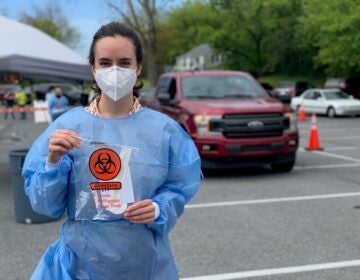Zoom grand juries continue in N.J. despite backlash from prosecutors, defense attorneys
A pilot program of online grand juries drew criticism as unfair to defendants. Lawyers also cited technical problems, with jurors dropping off.

Richard J. Hughes Justice Complex, Trenton, New Jersey. (Emma Lee/WHYY)
Are you on the front lines of the coronavirus? Help us report on the pandemic.
Prosecutors and defense attorneys in New Jersey are calling for an end to virtual grand juries, which began in May as a way to keep criminal cases moving while the coronavirus pandemic forced residents to stay home.
But lawyers for both the government and the accused say conducting grand juries over Zoom is unfair to defendants and risks the secrecy at the heart of grand jury presentations.
Matthew Adams, a partner at Fox Rothschild and vice president of the Association of Criminal Defense Lawyers of New Jersey, called virtual grand juries “unconstitutional — unambiguously unconstitutional.”
“Would you want your loved one being subject to the whims and attention of somebody behind a computer screen if they stood accused of a crime?” Adams said.
In New Jersey, prosecutors present cases involving indictable offenses — called felonies in other states — to 23-member grand juries, which decide whether to sign off on an indictment. More often than not, they do.
In May, two months after the state judiciary halted all in-person court proceedings, it started a virtual grand jury pilot program in Mercer and Bergen counties. The program allowed prosecutors to present cases over Zoom to grand jurors who were tuning in from home on an internet-connected device.
Judge Glenn Grant, acting administrative director of the state judiciary, said the pilot program was born out of a desire to balance the health of grand jurors and court staff with the “extraordinary responsibility to move the wheels of justice” for the nearly 2,000 defendants awaiting indictment in jail — as well as the victims of crime.
“Virtual grand juries are our best alternative if we’re going to be able to move these cases forward,” Grant said. “It is an interim measure. Obviously we would like to be back in our buildings.”
The state gives a laptop or tablet and headphones to grand jurors who need them and offers IT support to help grand jurors connect to the proceedings. Grand jurors must swear to keep the deliberations secret.
Grant said the court system simply does not have enough space to accommodate socially distanced in-person grand juries. But a growing chorus of attorneys from both sides of the courtroom say the virtual grand jury pilot program is rife with problems and should be scrapped. Both the Association of Criminal Defense Lawyers of New Jersey and the County Prosecutors Association of New Jersey have come out against it.
Mercer County Prosecutor Angelo Onofri said attorneys in his office have reported technical issues from the outset with the pilot program.
“We’ve had several examples here where the grand juror has either dropped off completely or they couldn’t hear a witness’s testimony, and that’s very concerning to us because the grand jury panel isn’t getting the entire flavor for the case,” Onofri said.
In one instance, a grand juror asked her grandson to help her connect to the proceedings. Onofri said the grandson eventually left the room, but the episode illustrated the difficulties of maintaining secrecy in remote deliberations, which protects the reputation of defendants and the identity of witnesses and jurors.
Critics also say it’s difficult for grand jurors to assess the credibility of witnesses over Zoom, and that it is nearly impossible to pick up on small physical cues that one might easily see in an in-person setting.
Onofri praised Judge Grant and New Jersey Supreme Court Chief Justice Stuart Rabner for thinking “outside the box,” but said the virtual grand jury experiment fell short.
“The judiciary came up with a virtual and technical solution in the virtual grand juries, where an analog approach — namely a live grand jury — would probably have been more effective,” he said.
So far virtual grand juries in Mercer and Bergen Counties have returned indictments in 47 cases and declined to indict defendants in three cases, Grant said.
The state is also in the process of setting up a virtual grand jury for cases brought by the office of Attorney General Gurbir Grewal, according to spokesperson Sharon Lauchaire.
“NJ is facing an unprecedented crisis, and we need to examine solutions that we might not consider in ordinary times,” she said. “We cannot indefinitely halt the criminal justice process and allow a backlog of cases to develop while individuals are detained and the memories of witnesses fade.”
The virtual grand jury pilot program is continuing in New Jersey state courts even as the federal courts hold in-person proceedings and New York State (outside of New York City) has resumed live grand juries.
Grant said he wanted to continue the grand jury pilot program to show prosecutors it was the state’s best option for ensuring cases proceeded swiftly during a pandemic.
“If we knew that this crisis was going to end tomorrow, we would not be engaged in these kinds of technological solutions,” he said.
He added that the state was polling grand jurors before and after each session to ask them about any technical issues, and said grand jurors should be trusted to maintain secrecy from their homes in the same way they would in a courtroom. Grant added people at high risk of complications from coronavirus may not want to travel to a courthouse for in-person proceedings.
But Adams, the defense attorney, said there are too many things stacked against defendants in virtual grand jury settings and that it’s unfair to continue the pilot program for the sake of processing cases.
“We all acknowledge that we’re in uncharted territory. We all acknowledge that this is something that we have never before faced as a society and as a criminal justice system,” Adams said. “However you can’t sacrifice fundamental constitutional rights at the altar of expediency.”

Get daily updates from WHYY News!
WHYY is your source for fact-based, in-depth journalism and information. As a nonprofit organization, we rely on financial support from readers like you. Please give today.



![CoronavirusPandemic_1024x512[1]](https://whyy.org/wp-content/uploads/2020/03/CoronavirusPandemic_1024x5121-300x150.jpg)


